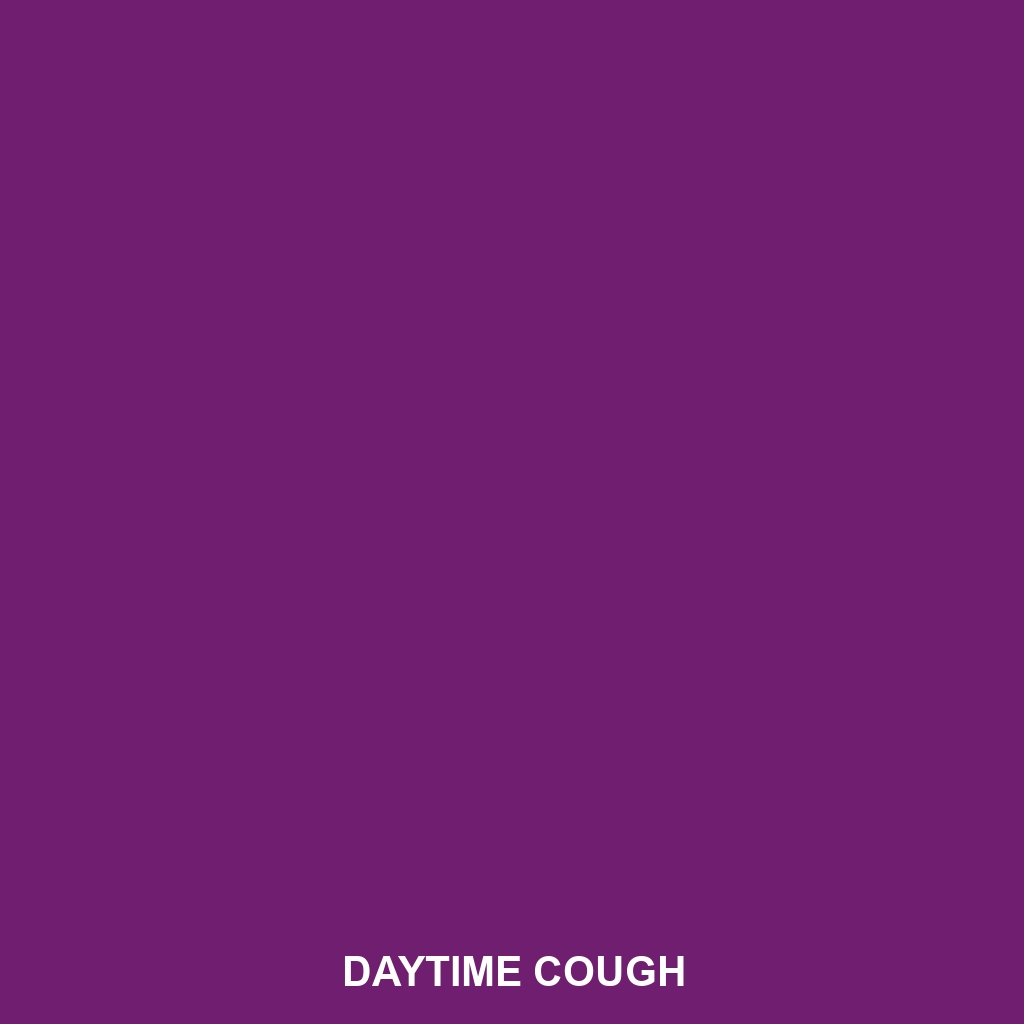Daytime Cough:
Definition and Description of Daytime Cough:
Daytime cough is characterized by a persistent cough that occurs frequently during the hours of wakefulness. It can be a symptom of various underlying conditions, ranging from irritations in the throat to more serious respiratory issues. Medically, a cough is defined as a reflex action to clear the airways of mucus, irritants, or foreign particles. Daytime cough can vary in severity and frequency and may disrupt daily activities and social interactions.
Causes of Daytime Cough:
Several factors can contribute to a daytime cough, including:
- Infections: Viral infections, such as the common cold or flu, can lead to a temporary cough.
- Allergies: Allergens like pollen, dust, and pet dander can provoke coughing.
- Asthma: This chronic condition often leads to coughing, especially during exertion or exposure to triggers.
- Gastroesophageal reflux disease (GERD): Acid reflux can irritate the throat, causing a chronic cough.
- Environmental irritants: Smoke, pollution, and strong odors may exacerbate coughing.
Associated Symptoms of Daytime Cough:
Common symptoms that may accompany daytime cough include:
- Sore throat: Often the result of persistent coughing.
- Shortness of breath: Particularly in cases linked to asthma or respiratory infections.
- Wheezing: A high-pitched sound during breathing, often associated with asthma.
- Chest discomfort: Resulting from coughing and irritation.
- Runny or stuffy nose: Frequently occurs with respiratory infections or allergies.
Diagnosis of Daytime Cough:
Healthcare professionals typically diagnose daytime cough through:
- Physical examination: Assessing the patient’s medical history and symptoms.
- Chest X-ray: To rule out infections or structural abnormalities in the lungs.
- Pulmonary function tests: Commonly used to evaluate airflow and breathing problems.
- Allergy testing: To identify potential allergens.
Risk Factors for Daytime Cough:
Certain individuals may be at greater risk for developing a daytime cough, including:
- Children: Their immune systems are still developing, making them more susceptible to infections.
- Smokers: Smoking can lead to chronic bronchitis and other respiratory problems.
- People with pre-existing respiratory conditions: Such as asthma or COPD.
- Individuals living in polluted environments: Poor air quality can exacerbate respiratory symptoms.
Complications of Daytime Cough:
If left untreated, daytime cough can lead to various complications, such as:
- Chronic bronchitis: Ongoing inflammation of the airways.
- Pneumonia: Bacterial infection of the lungs can develop from persistent coughing or infection.
- Sleep disturbances: Resulting from nighttime coughing episodes that compound the daytime issue.
- Impact on quality of life: Social interactions and daily activities may be significantly affected.
Treatment Options for Daytime Cough:
Treatment for daytime cough is centered around its underlying cause and may include:
- Over-the-counter medications: Cough suppressants and expectorants.
- Inhalers: For individuals with asthma to control symptoms.
- Allergy medications: Such as antihistamines.
- Home remedies: Including honey in warm water and steamy showers to relieve symptoms.
When to See a Doctor for Daytime Cough:
It is advisable to seek medical attention if:
- The cough persists beyond a few weeks.
- There is a presence of blood in the mucus.
- Accompanied by fever or significant shortness of breath.
- Unexplained weight loss occurs.
Prevention of Daytime Cough:
To reduce the likelihood of developing a daytime cough, consider the following strategies:
- Avoid smoking and secondhand smoke: Tobacco can greatly irritate respiratory passages.
- Maintain a healthy environment: Keeping your living spaces clean to reduce allergens.
- Practice good hygiene: Regular hand washing can help prevent infections.
- Stay up to date with vaccinations: Such as the flu shot to protect against respiratory infections.
Statistics and Prevalence of Daytime Cough:
According to studies, cough is among the most common reasons individuals seek medical care, with approximately 30% of patients reporting chronic cough. Moreover, research indicates that up to 10% of adults may experience a chronic cough lasting more than eight weeks.
Personal Stories or Case Studies about Daytime Cough:
Many individuals have shared their experiences battling daytime cough. One common theme is the frustration with misdiagnosis and the journey to find appropriate treatment. Case studies demonstrate the importance of thorough testing to identify underlying causes effectively.
Myths and Misconceptions about Daytime Cough:
Myth: Coughing is always a sign of a severe illness.
Fact: While a cough can indicate a problem, it is often a result of mild issues like allergies or a cold.
Myth: Suppressing a cough is always a bad idea.
Fact: In certain cases, such as after surgery, it’s essential to manage cough to prevent complications.
Support and Resources for Daytime Cough:
For more information and resources to assist those dealing with daytime cough, visit this support page for additional resources and help.
Conclusion about Daytime Cough:
Daytime cough can significantly impact one’s quality of life but can be managed effectively with proper diagnosis and treatment. Recognizing the symptoms and seeking timely medical advice is crucial. If you or someone you know is suffering from a persistent cough, consider the points raised in this article to take the necessary steps toward relief.
